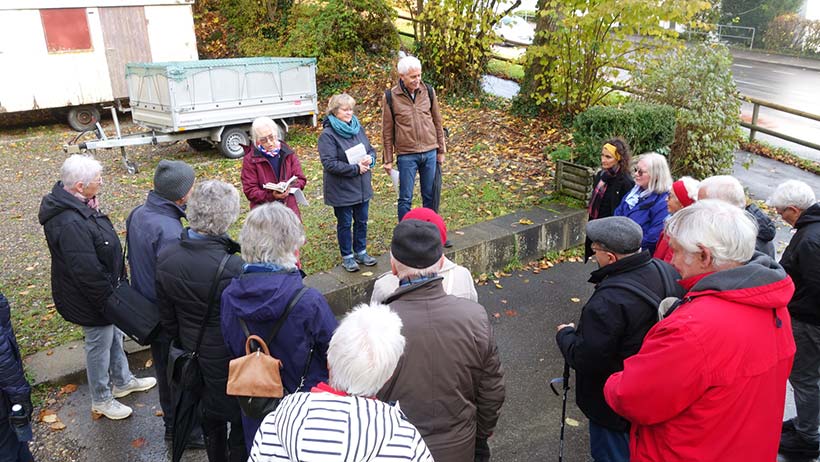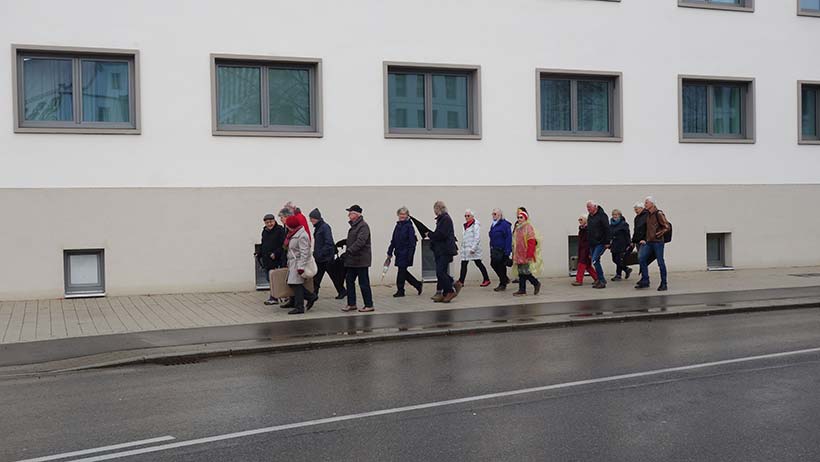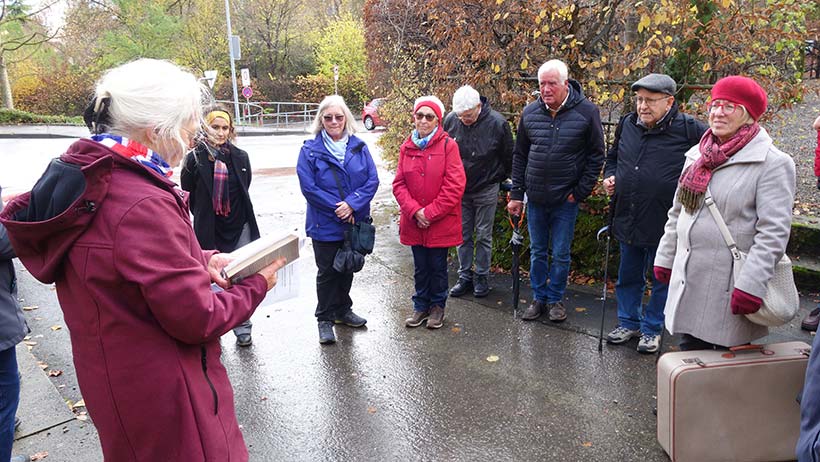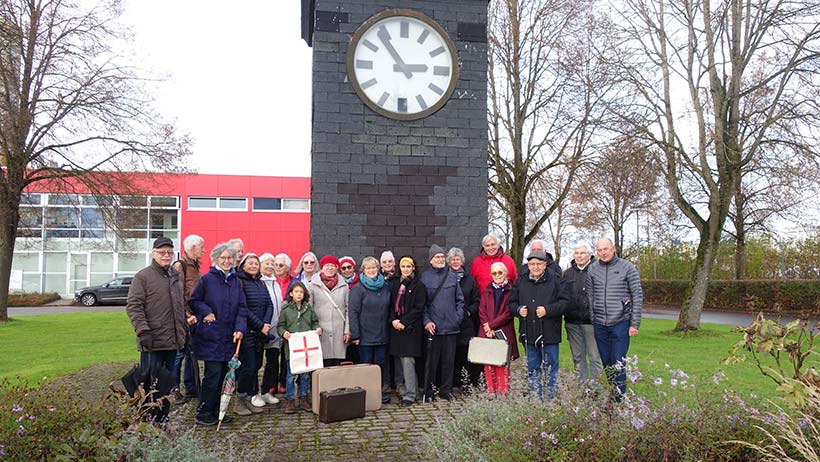80th anniversary of the arrival of deportees from Guernsey to Camp Lindele, Biberach
Monday 14 November 2022 was the 80th anniversary of the arrival of deportees from Guernsey to Camp Lindele, Biberach – an occasion marked with a commemorative walk by members of the Biberach Friends of Guernsey. The following article was translated from German & provided by Helga Reiser, Chair of the Biberach Friends (along with photography on the day).
Today, former deportees from Guernsey meet us with love and tolerance
“Much has been written by Deportees and historians about the deportation, the journey and life in the Camp itself over the years but the impact of this experience on each individual was, and still is, different. Some deportees were able to talk of their experiences whilst others found the memories too difficult to share and never spoke of them.” This is what Jill Chubb from the Guernsey Association of former Deportees wrote in her letter to the Biberach Friends of Guernsey for the occasion. Members of this Twinning Association took the day of the arrival of the first group of deportees from Guernsey as an opportunity to walk from Biberach Railway Station to the former Lager Lindele, today a Police College for Further Education. About 25 people turned up for this commemorative walk, among them the former Mayor of Biberach, Thomas Fettback, plus members of the Jersey Committee from Bad Wurzach.
At the end of September 1942, British citizens not born on the island had to leave their home within a few days. They first crossed to St Malo, Normandy, where they boarded a train that took them in three days via France and Luxembourg to a former POW camp in Dorsten. From this camp, which was in a shocking state at their arrival, men, women and children were transported in a 36-hour train journey to Biberach with very poor travel provisions. In the early afternoon of Monday 14 November, 1942 they arrived at Biberach Station.
Helga Reiser from the Friends of Guernsey Committee, and Rotraud Rebmann read in turn from books by Reinhold Adler ( „Es war nicht nur Karneval im August“ – “This was not just Carnival”) and from the publications of diaries and memories: “The day the Nazis came“ by Stephen Matthews and “Beyond the Wire“ by Margaret Rose“. Starting at the Station, Garland, later the Camp Leader, was quoted from Adler‘s book. “After all our belongings had been unloaded we were organised in rows of five, and all, except the sick, had to carry their luggage up the steep hill to the camp, a good mile. It was snowing, and the snow on the ground was already quite dee. Whoever was strong enough helped to carry the
luggage of those who could not cope. For some older people this was too much and they lagged behind, but were immediately pushed back into the rows by the guards with their rifle butts
At the first stop, the participants of the walk heard from Stephen, then four years old, who remembers in his book, “women struggling with their babies and men burdened with heavy suitcases and parcels” and “pathetic stragglers with the old and infirm falling further and further behind”, being “rounded up and verbally abused and jostled by the malignant German guards”. One of his precious tennis balls with which he tried to occupy himself flew off and bounced down the road and stopped just beyond the guards. “As I went forward to pick it up I received a hefty clout on the side of my head from an angry guard. I was hustled back into the shuffling group and had to leave my ball lying there just out of reach.”
“You must help your mother”, said Margaret’s father and left her to her own luggage and her mother, “who was in increasing distress”. It was impossible for the 8- year- old little girl to support her mother, as she herself was struggling with uneven and painful shoes, a pair of women’s high heels, which her father had cut down, as her beautiful patent leather had been destroyed. “I was not only uncomfortable but deeply ashamed at not having taken notice of the order to wear warm sensible footwear.”
Reinhold Adler in his book quotes Eric Sirett, one of the deportees, who remembers the spontaneous help, when two young boys helped a married couple by loading their two big suitcases onto their sledge and tore them up the hill right to the entrance of the camp.
Following the deportees’ walk up the hill to the destination, the group heard on three stops about the procedure men, women and children had to go through on their arrival. Garfield Garland, as well as Stephen Matthews and Margaret Rose report that on arrival a strict roll call was expecting them. “Eine. Swie. Drie. Fere. Funf” – in rows of five they were counted again and again, as the numbers and the lists from Dorsten did not tally. Exposed to a biting wind, children frozen with the cold and women and men totally exhausted, Garland could no longer bear it. He declared his responsibility for the group, and that he would do his best to recount them so that the guards would be contented if only they were permitted to eat the meal that had been prepared for them by Channel Islanders from Jersey who had already been in the camp. With this new round of counting it was revealed that a baby had been overlooked and that some sick people who had to stay in Dorsten had not been taken off the list. When they finally were given their soup and jacket potatoes and could return to their barracks, the soup was cold and almost inedible. Margaret’s commentary in her book: ”We were starving and fell on the food like a pack of ravenous wolves. It was one of the best meals I have ever tasted and even today when baked potatoes are served I can’t help remembering that glorious moment”
Jill Chubb in her message: “Perhaps the biggest emotion suffered by most was the fear of the unknown. This was only heightened by being taken from their homes, and leaving friends and relatives. There were no certainties about what the fate of the Deportees would be until the day of Liberation“ on 23 April 1945.
“The purpose of marking events such as these must surely be to learn the futility of war and the hatred that it causes and ensuring, by coming together united, as friends today, we are able to show future generations the importance of love and tolerance”.
To round up the 2022 event there followed a guided tour through the exhibition “Life behind Barbed Wire” in the building of the Police College transmitting an impression of the conditions at Lager Lindele.





